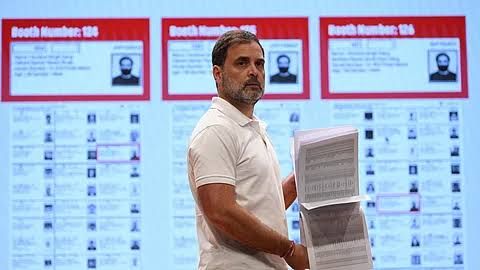
Table of Contents
ToggleIntroduction
Indian politics witnessed a storm this week when Congress leader Rahul Gandhi dropped what he called an “atom bomb” of evidence against the Election Commission of India (ECI) and the Bharatiya Janata Party (BJP). At the center of his claims? Allegations of massive voter list manipulation, “stolen” votes, and systemic bias. The accusations have triggered a nationwide war of words, opposition unity, and renewed debates on electoral transparency.
Rahul Gandhi’s Core Allegations
During a rally in Bengaluru, Gandhi alleged that in Karnataka’s Mahadevapura Assembly segment, over 1,00,250 votes were “stolen” using multiple fraudulent methods.
His claims include:
- Duplicate voter entries
- Fake or unverifiable addresses.
- Invalid or mismatched photos.
- Bulk voter registrations.
- Misuse of Form 6 for mass inclusion of fake names.
He challenged the ECI to release 10 years of complete electronic voter lists along with election videography, claiming it would expose large-scale malpractice.
The Clash With the Election Commission
The ECI swiftly rejected Gandhi’s allegations as “absurd” and demanded he sign a sworn legal declaration or issue an apology.
In response, Gandhi pointed out that he had already taken an oath to uphold the Constitution as a Member of Parliament, calling any additional affidavit “unnecessary” and politically motivated.
Political Reactions Across India Opposition Support
Leaders such as Shashi Tharoor, Akhilesh Yadav, Priyanka Gandhi, Uddhav Thackeray, and RJD openly supported Gandhi’s stand. Protests erupted in Mumbai where Congress workers accused the ECI of failing to correct faulty voter lists.
BJP and State Leaders’ Counterattack
BJP leaders dismissed the allegations as scripted drama. Maharashtra CM Devendra Fadnavis even likened the claims to a “poll fraud movie script by Salim-Javed,” accusing Gandhi of theatrics.
Regional Fallout
In Madhya Pradesh, Congress veteran Kamal Nath praised Gandhi’s move as historic, while BJP leaders labeled it “urban Naxalite mindset” propaganda.
Why This Matters for Democracy
This controversy has reignited public discussion on:
Electoral integrity and transparency.
The independence of constitutional bodies like the ECI.
The role of opposition in safeguarding democratic processes.
If Gandhi’s demand for decade-long voter data is met, it could set a precedent for public access to electoral records—potentially reshaping how India conducts elections.
Conclusion
Whether Rahul Gandhi’s claims are proven true or dismissed as political theater, the allegations have already shifted the spotlight to India’s electoral processes. As protests, counterattacks, and investigations unfold, one thing is certain: the debate over free and fair elections in India is far from over.



Leave a Reply